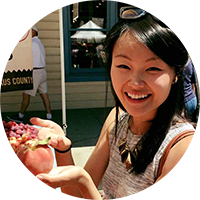
Scooters
Ubon Ratchathani
The man at the shop did not want to let me leave the store. I suppose it was suspicious that I asked him to give me a quick rundown of all the controls right after I assured him that I'd ridden one of these things before. It was the truth, though. A few days ago at the farm, I asked Jessada to teach me how to ride his motorbike and I received a 15 minute lesson– much more efficient than the 2-day, 16 hour class I passed up in San Francisco.
Hesitant as he was, he realized his wife had already processed the 500 baht (~ 14USD) I had paid for a full day rental and he was anxious to return to his cigarette. He gave me a thorough review and watched nervously as I tried to get the 200 lb scooter off their property gracefully yet quickly before he could change his mind.
The scooter was automatic and much simpler to handle than the semi-automatic motorbike I used to learn. Theoretically, it should have been easier, except instead of being on a huge farm with idling sheep as obstacles to avoid, I was in a populous Thai city that mostly got to places on motorized wheels and without much regard for traffic rules. Red lights were a mere suggestion. The one with the larger set of balls gets the right of way. To develop this intuition would have surely taken me a while. I knew I had to get out of the busy city center if I were to survive an entire day on this thing.
I ended up riding an hour east along the Mun river to a city called Phibun Mangsahan. As someone who's spent most of her life avoiding combinations of speed and perceived danger, it was thrilling! There was little to no traffic for 90% of the ride. It was my first time feeling such freedom– different than having a car and all the windows down. It was hot that day (well, it's hot everyday) and I didn't even mind that everytime a truck passed by, dust, dirt and occasionally ill-fated bugs would fly into my body and stick to my sweat.
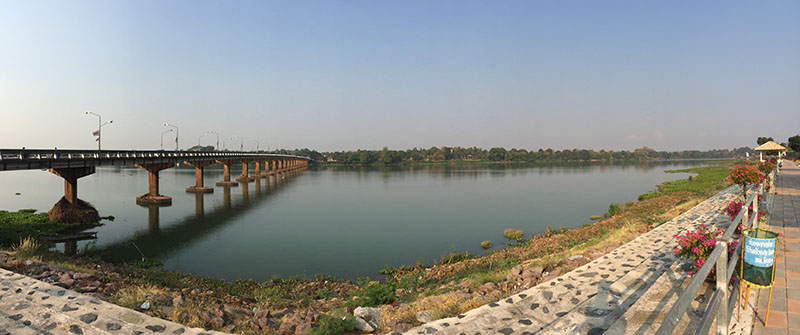 View of the park along the Mun river. There were many vendors trying to
sell me 'picnic' packages.
View of the park along the Mun river. There were many vendors trying to
sell me 'picnic' packages.Being Canadian
I realized much too late in my trip that Thai people either 1. do not think/know about Canada at all, and/or 2. do not understand the concept of multi-culturalism. It took me a while to decipher the look people would give me after I tell them I am from Canada. My moment of clarify came when one of the more adept English-speaking Thais would reply, "Canada? But you look so Asian!".Camping
Khong Chiam
The whole situation was confusing because we could not understand each other. Yet I, and another girl (M), agreed to go on an overnight trip with our host (K) with whom we usually speak in bursts of loosely-strung verbs and nouns and trust that we're both walking away with the same interpretation of the conversation. My understanding was that we would be going camping in Khong Chiam, the eastern-most city in Thailand, bordering Laos and boasting views of the famous Mekong River. M was fairly convinced we would be staying with our host's friend who owns or works at a temple in the area.
K commissioned a local bus driver and his wife to accompany us to our destination (we only found this out much later. M and I spent most of dinnertime trying to figure out the relationship of the 2 mystery people and our host. They seemed like friends, but the man and woman were doing all of the dinner prep work as well as the cooking and cleaning.) The ride took about 2 hours and we made a stop along the way at the local market before reaching the national park (we had no idea we were heading towards a national park. The admission fee for foreigners was about $15US compared to about $2US for locals).
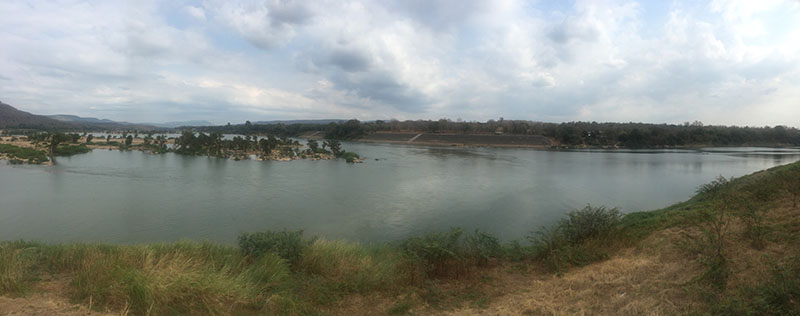 Known as the "2 color river", this is the spot where the Mun river
(flowing eastwards from Thailand, starting near Pak Chong) and the
Mekong river (flowing from western China through Southeast Asia,
dividing Thailand and Laos) meet. During rainy season, it's said you can
see distinctly the two colors of the river when they join.
Known as the "2 color river", this is the spot where the Mun river
(flowing eastwards from Thailand, starting near Pak Chong) and the
Mekong river (flowing from western China through Southeast Asia,
dividing Thailand and Laos) meet. During rainy season, it's said you can
see distinctly the two colors of the river when they join.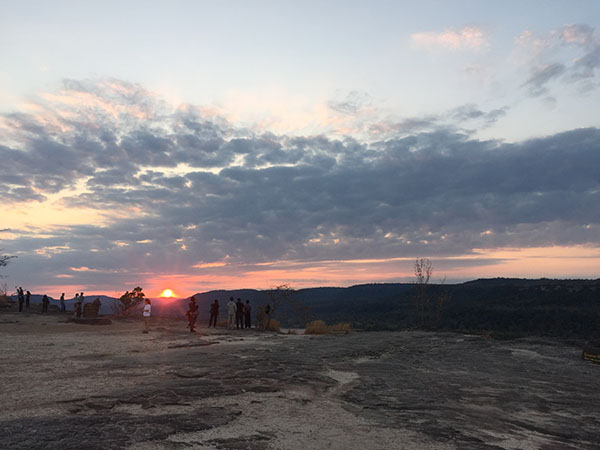 Pha Tam National Park boasts the first sunrise in Thailand. We got up
at 5:30AM to witness this. It was beautiful and then quickly turned
blinding and I spent the rest of the morning questioning the
significance of waking up early to watch the sunrise seconds before the
rest of Thailand (who would surely still be asleep) could.
Pha Tam National Park boasts the first sunrise in Thailand. We got up
at 5:30AM to witness this. It was beautiful and then quickly turned
blinding and I spent the rest of the morning questioning the
significance of waking up early to watch the sunrise seconds before the
rest of Thailand (who would surely still be asleep) could.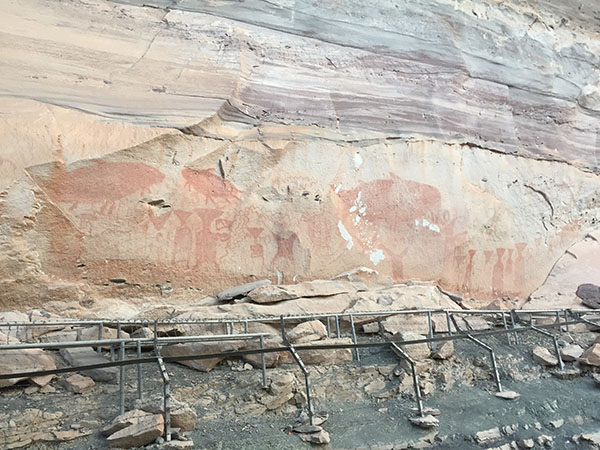 Various sets of these cave paintings were discovered along a cliff wall
in Pha Tam National Park. They are estimated to be over 3000 years
old!
Various sets of these cave paintings were discovered along a cliff wall
in Pha Tam National Park. They are estimated to be over 3000 years
old!To M's dismay, my deduction skills triumphed and we ended up camping inside Pha Tam National Park. It was the most unprepared I had been for a camping trip since I tried to pack light, somehow thinking we would be going on a hike and I didn't want to lug around a lot of stuff with me. The camping experience wasn't too different than what I've experienced in America. It was nice because we were able to rent tents and sleeping bags for a low price (about $6 total) and they even set it up for us. The restroom facilities were also very clean!
Crop burning
Wung Si Sote
I had learned about crop burning before heading over to Thailand since my trip was going to overlap with the season. From my understanding, farmers burn their crops as a quick means of clearing the land, generating fertilizer, and readying for the upcoming rainy season.
On my first night at the farm, I was on kitchen duty. I went outside to take out some trash when I saw in a not-too-far distance a raging fire! I couldn't see much else beyond the trees but there was definitely a huge fire growing alarmingly close by. I went inside and asked the other folks about it. "Oh yeah, that's normal", Zeke, the youngest boy in the host family told us. "You wanna see it?"
Zeke led me and some other volunteers through their family property, leaping over giant boulders to get to the barbed wire fence dividing the two properties. "What? You've never jumped over barbed wire before?". Suddenly I felt like I was on the school playground and the 8th grader was sizing me up.
We all got over the barbed wire fence, admittedly in a less cool fashion and much more age and fragility-aware method than Zeke did, and we were right up there with the crop burning. The fire was big yet controlled, each sectioned off in a little ditch carefully dug out to prevent any unplanned spread.
Zeke shared some interesting insights with me about what would happen if the crop burning so closeby were to affect his family's land and damaged their property. He told me that in the Thai countryside, usually disputes will be settled quickly and fairly. The party who was in the wrong (and who knows they were in the wrong) would not try to hide their guilt and instead negotiate down a settlement to the injured. This is because it's a hassle for everyone to head into the city to go to court. The courts in Thailand are often overbooked and the trip in during business hours would cost farmers valuable time they could be spending prepping their land. Thus, fairness and quickness to settlement is an understood and shared value in the countryside.
Night markets
I don't have much to share about the various night markets I visited in Thailand, but here's a cool video I shot of a night market setting up in Pak Chong.
Phana
Phana (pronounced "puh-na") is a small village of 2000 people in the province of Amnat Charoen. It has garnered small town fame for the Don Chao Poo Monkey Forest, though it still remains largely unknown to oversea and even local tourists. The village sees a small but steady stream of foreigners that come to the village to either teach English at the local school or researchers that come to conduct studies on the monkeys.
I was told that I was the first official tourist whose purpose was solely to explore and learn the culture of Phana. By comparison, my stay would be much shorter.
I had 2 sets of hosts in Phana– the first was the owner of the home I stayed in and the second is a retired couple. The wife, Pensri, is Thai and grew up in Phana, and her husband, Lawrence, is British. While in Phana, I had the opportunity to:
 ... visit the monkey forest. We fed them leftover vegetables and
fruits. Locals usually come by to leave food for the monkeys, and of
course monkeys love food so they will swarm the generous donor to get
their share and then run off to a safe distance away to enjoy their
fare. Pictured is Lawrence spreading the fare of oranges.
... visit the monkey forest. We fed them leftover vegetables and
fruits. Locals usually come by to leave food for the monkeys, and of
course monkeys love food so they will swarm the generous donor to get
their share and then run off to a safe distance away to enjoy their
fare. Pictured is Lawrence spreading the fare of oranges.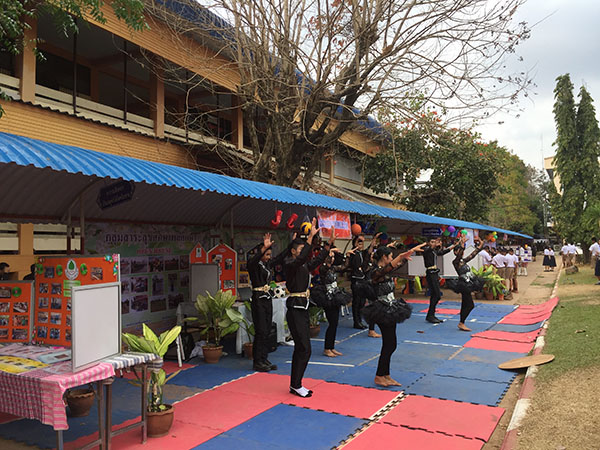 .. visit the local high school open house. They had performances by
students and every school subject had a booth showcasing projects from
the year. Many local education officials attended the open house and we
were asked to stand in many pictures with them, I suspect, because we
are foreigners. My impression was that having foreigners in a picture
helps boosts the prestige.
.. visit the local high school open house. They had performances by
students and every school subject had a booth showcasing projects from
the year. Many local education officials attended the open house and we
were asked to stand in many pictures with them, I suspect, because we
are foreigners. My impression was that having foreigners in a picture
helps boosts the prestige.Side note: I felt like a celebrity in Phana. Even though I am also Asian, I looked very different from your average Thai person. I was asked to take many selfies and be in many photos with locals, including a swarm of 10 police officers at the local night market!
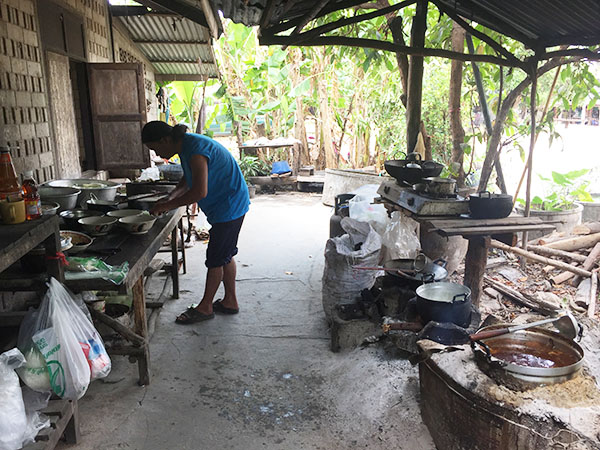 ... experience delicious local restaurants. The chef pictured here
perfected his craft over the period of 10 years in Hong Kong and Macau.
Now, he's retired back near Phana where he serves a single dish, duck
noodle soup, out of his home.
... experience delicious local restaurants. The chef pictured here
perfected his craft over the period of 10 years in Hong Kong and Macau.
Now, he's retired back near Phana where he serves a single dish, duck
noodle soup, out of his home.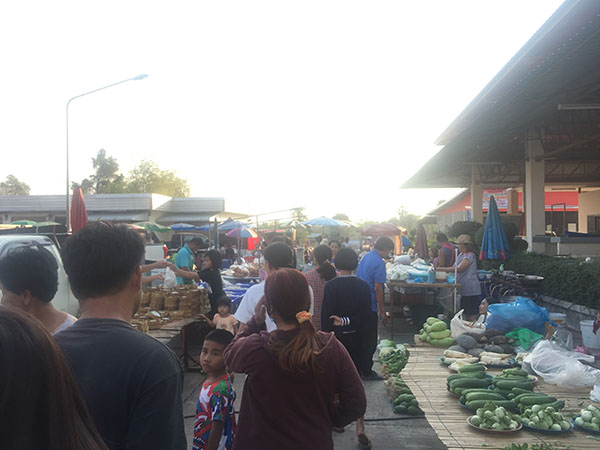 ... visit the local night market in Phana. There are a few local market
spots and a different one is bustling on different days of the
week.
... visit the local night market in Phana. There are a few local market
spots and a different one is bustling on different days of the
week.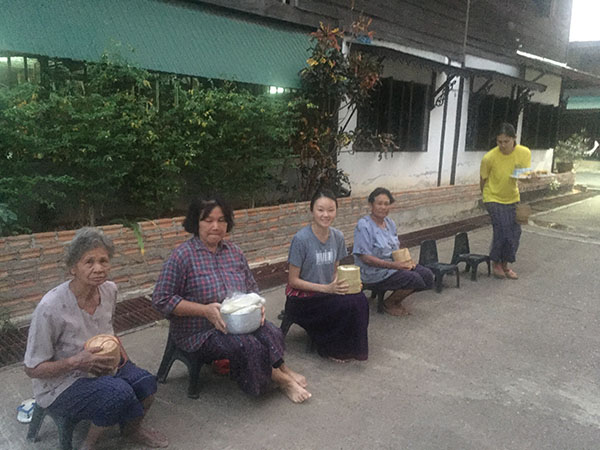 ... give alms to the local Buddhist monks. I woke up at 6AM to join the
local women who get up early every morning to perform this ritual. The
Buddhist monks only eat 2 meals a day and both are eaten before noon.
Since they don't have any money, they make their rounds through the
village in the morning gathering food from the locals.
... give alms to the local Buddhist monks. I woke up at 6AM to join the
local women who get up early every morning to perform this ritual. The
Buddhist monks only eat 2 meals a day and both are eaten before noon.
Since they don't have any money, they make their rounds through the
village in the morning gathering food from the locals.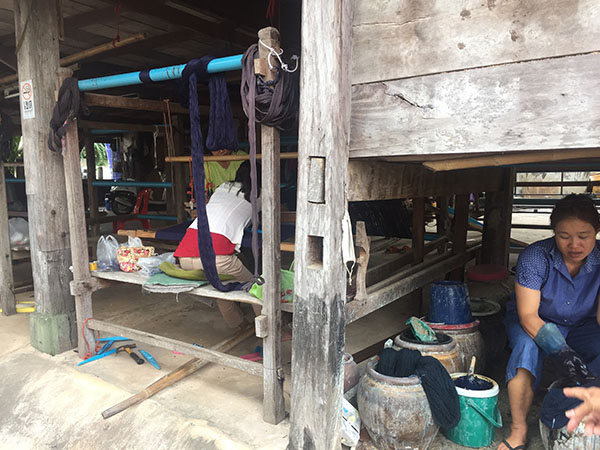 ... visit the local silk weaving cooperative. This group of women have
been weaving (left) and dyeing (right) silk together for many
years.
... visit the local silk weaving cooperative. This group of women have
been weaving (left) and dyeing (right) silk together for many
years.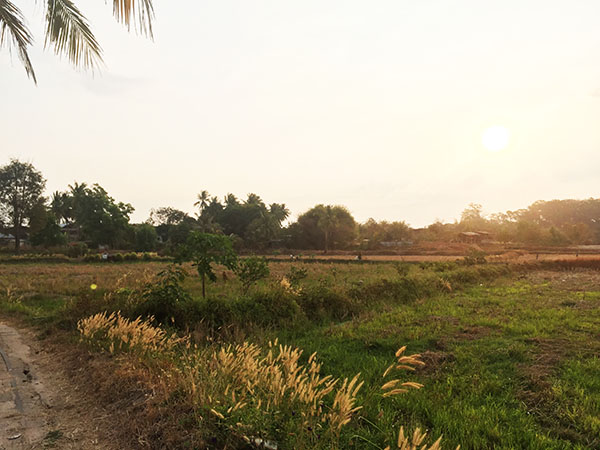 ... go on various bike rides and experience the beautiful
scenery!
... go on various bike rides and experience the beautiful
scenery!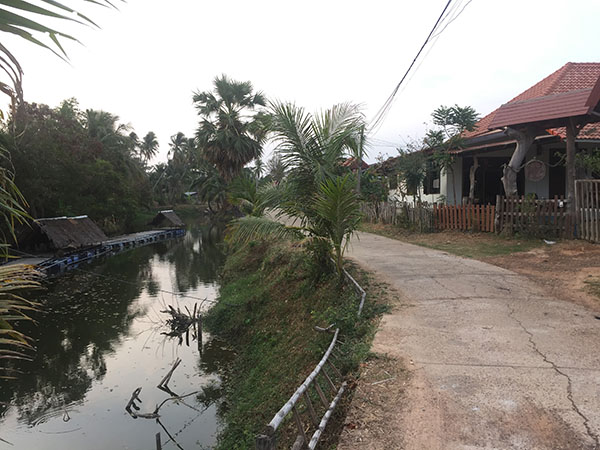 ... get lost in the small streets, of course.
... get lost in the small streets, of course.It was a great experience. If you'd like to visit Phana, the best way to do so is through a homestay. The village does not have any hotels nor do they actively promote tourism.
Thai showers
Phana
In Phana, I stayed in a traditional wooden-style house built by the father of my host. The house itself is beautiful with mostly handmade wooden furniture. I had my own bedroom upstairs and there was an out of place high-tech washing machine on the first floor for us to use. So far so good, until she showed me the bathroom.
The bathroom itself was large, but bare. In one corner was a western-style toilet, and in another, a large and blocky basin full of water. It was the size of a bathtub but with taller dimensions and it was built into the walls of the bathroom (like what a tub in a Lego house might look like if you and I had the same architectural imagination as a kid). There was also no sink; in fact, the faucet could be seen hanging from a hole in the wall. I asked about it, and my host told me sheepishly that the sink is broken. You could tell she had no intention or use in fixing it.
The first time I took a Thai shower, I was very hesitant. The water had been sitting there for god knows how long and there could have been hundreds of dead mosquitos or bacteria floating around. But it was my only choice. So I picked up the giant floating scoop, filled it with water, took a deep breath, and dumped the cold liquid over my head.
In just a split second, I understood why the Thai shower exists. It is so hot in Thailand and this basin of water stays at a perfect cool temperature throughout the day. There is no need for a water heater so really there is no need for a western-style shower. It is dry in Thailand and water is scarce, so having it come out of a shower head can simply be wasteful. And yes, the number of dead mosquitos floating around gradually increases but it's negligible when you think about the amount of bugs flying into you and getting caught in your sweat throughout the day. Lastly, having water dumped on you versus a stream coming out of a showerhead are two completely different showering experiences, the former now being my preferred method.
I became a huge fan of the Thai shower. I didn't mind getting hot and sweaty during the day because I looked forward to showering the second the sun set every night. It was the most glorious reward for getting through another hot day in Thailand.
Phana was the only place I experienced this. While I was staying at the farm, they actually upgraded our standing showers to have the large rainwater showerheads. That, too, was glorious. I'm convinced showers are just great all around.
